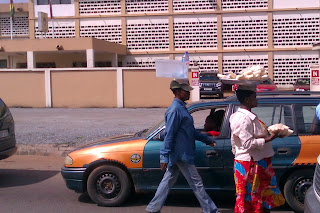"I
was divorced by my wife because I sell popcorn."
These are not my words; they are the exact words of a popcorn vendor at the
Makola Market in Accra. I was enveloped in fascination when I caught sight of
this man in his late thirties with his younger brother struggling to make ends
meet with the selling of popcorn on a truck. The name of this popcorn seller is Agbeshi.
On the truck were two
popcorn machines: one for salt flavored roasted corn and the other for sugar flavored
roasted corn powered by an electrical generator and engulfed with a boom of
music for the attraction and entertainment of prospective buyers. This man is a
trained mechanical engineer by profession with a National Vocational Training
Institute (NVTI) certificate. He told me that he decided to add the popcorn
business to his professional work because his latter work was not lucrative
enough to sustain him and his family in the capital of Ghana.
Agbesi narrated that he has been in the popcorn business for over four years. As the
business flourished, he married his divorced wife. They had married for two and
half years. He recalled a time when he was having a nap in his room in one
foggy afternoon; his wife broke the news to him that she wants to discontinue the
marriage with him. He embraced the news with shock and anguish! He told me that
his wife jilted him as a result of mounting pressure from her parents. His wife’s parents asked her to break up
with him because he was a ‘nobody’: a common popcorn seller.
According to him, some
people mock him because he sells popcorn. Sometimes he is hired for funerals to
prepare his delicious and appetising popcorn to sympathizers. Some people tease
him that he always prays that someone should die for him to be hired. As he
rightly put it, ‘some people laugh at me whenever they see me sell popcorn at
the funeral grounds.’
He complained that
indeed the cost of living in Accra is very hard especially, where he has to
pull the truck to sell in the streets of Makola and other vantage points from
3pm to 11pm. He was however quick to add that business has been quite
lucrative. Agbeshi is now married with two children: twins. He excitedly enunciated that he is a proud popcorn peddler.
video:"I am a proud popcorn peddler"!



